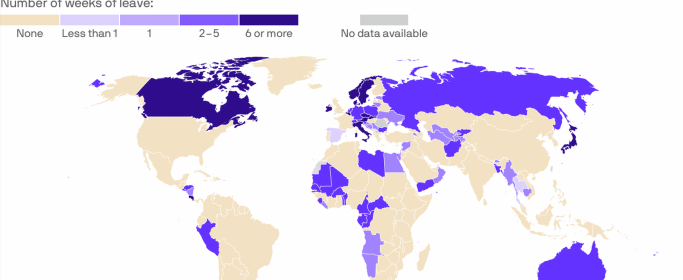Map: Countries where workers get paid leave to care for a sick parent

The lack of paid leave for new parents in the U.S. often grabs headlines, but there's a different kind of leave becoming an increasingly urgent issue: time off for workers to care for a sick parent.
The big picture: This kind of paid family health leave, typically structured as social insurance, is common in Europe. But globally, a majority of countries — including the U.S. — don't do it, according to a report from the World Policy Analysis Center released this week.
- Still, a few states in the U.S. do have paid family leave guarantees, including New York, where time off is funded by a small payroll tax on employers and employees.
Why it matters: The U.S. is on track to have the "largest generation of elderly adults in human history," as Axios' Tina Reed wrote last year. Someone's going to have to take care of these folks.
- There is already a shortage of in-home care workers available to meet the increasing needs of the aging population.
- So that care work often falls to their "kids," middle-aged sandwich-generation adults with jobs.
Zoom out: This is unpaid work, with financial repercussions for those who take it on — and with macroeconomic impacts on the labor force.
- Some caregivers end up leaving jobs altogether to care for a family member — as happened in the pandemic — while others work fewer hours, are absent more from the workplace, or become less productive.
By the numbers: According to a comprehensive joint AARP/National Alliance for Caregiving survey from 2020, before the pandemic, nearly 42 million adults said they were a caregiver of someone over the age of 50 — typically a parent or a parent-in-law. That's up from 40 million in 2015.
- The same study found that 69% of those caring for a parent are working. And just 4 in 10 have paid family leave.
- Several studies have shown that paid leave can prevent workers from leaving their jobs.
What's next: Given the past three years of the pandemic, it's likely there are many more folks doing unpaid caregiving now. "The pandemic has exacerbated an issue that was already on the rise," said Jason Resendez, the president of the National Alliance for Caregiving.
- The next big survey starts in 2024.
Source: Read Full Article
